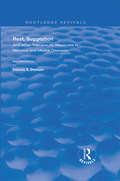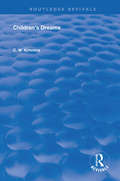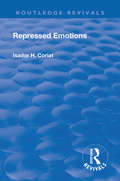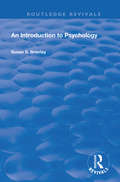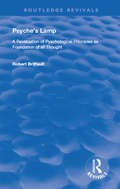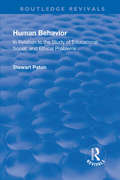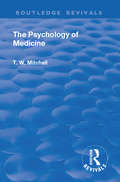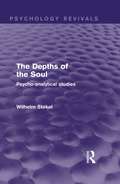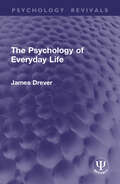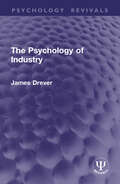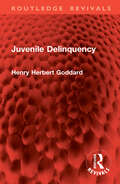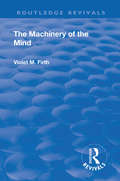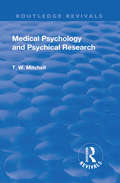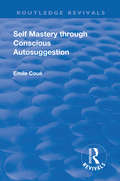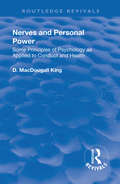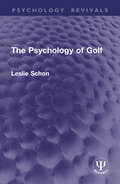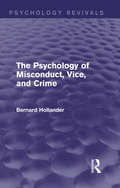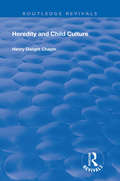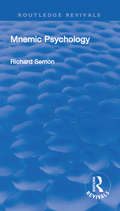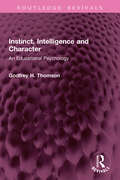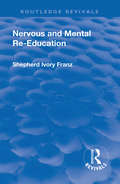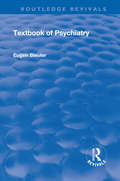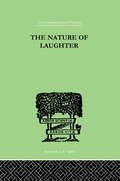- Table View
- List View
Rest, Suggestion, and Other Therapeutic Measures in Nervous and Mental Diseases (Routledge Revivals)
by Francis Xavier DercumFirst published in 1919. Emphasis has been laid upon simple physiologic methods of treatment; such as rest, feeding and psychotherapy. In order that the principles underlying the application of these methods should be clearly appreciated, the author has unfolded, in as systematic a manner as possible, the problems presented by the exercise of function, rest and the various fatigue states. He has adopted a purely clinical interpretation of the neuroses, a clear comprehension of which is an indispensable preliminary to intelligent and successful treatment. In embracing physiologic methods, medicines and psychotherapy in one volume, the author has endeavoured to present a comprehensive discussion of the treatment of nervous and metnal disorders; especially of those which are functional in character.
Children's Dreams (Routledge Revivals)
by Charles William KimminsOriginally published in 1920, Children's Dreams offers a rough classification of the type of dream peculiar to children of different ages, showing the variation from year to year and the influence of the environment. Considering children's dreams according to different age brackets ranging from five to eighteen years of age, and also considering the dreams of deaf and blind children, this book understands the important part played by the unconscious in the child's normal behaviour and recognises its educational value.
Revival: Repressed Emotions (Routledge Revivals)
by Isador H. CoriatPsychology in both its academic and practical aspects is now at the parting of the ways and the immediate future will determine whether it shall remain unproductive or become an instrument of practical importance in the guidance of human interests
An Introduction to Psychology (Routledge Revivals)
by Susan S. BrierleyOriginally published in 1921, this introduction to psychology includes chapters on the definitions and methods related to psychology; organism and environnment; and instinct and intelligence.
Psyche's Lamp: A Revaluation of Pyschological Principles as Foundation of All Thought (Routledge Revivals)
by Robert BriffaultOriginally published in 1921, Psyche's Lamp reminds the reader that all thought and discussion, to whatever aspect of confronting problems, social, political, ethical, vital and personal, they may be directed, posit psychological premises. In the darkness and confusion of a human world under reconstrction, where immemorial landmarks lie strewn and buried under the debris of collapsed super-structures, we shall vainly endeavour to thread our way to any purpose unless we can pierce the obscurity by the light of Psyche's lamp.
Psyche's Lamp;: A Revauation of Psychological Principles as Foundation of All Thought (Routledge Revivals Ser.)
by Robert BriffaultEmbark on a profound journey into the depths of human consciousness with Robert Briffault's Psyche's Lamp: A Revaluation of Psychological Principles as Foundation of All Thought. This insightful and thought-provoking work challenges conventional understandings of psychology, proposing a revolutionary perspective on the role of psychological principles in shaping all human thought and culture.Robert Briffault, a distinguished anthropologist, sociologist, and thinker, presents a compelling argument for the centrality of psychological principles in the development of human knowledge and societal structures. In Psyche's Lamp, Briffault re-evaluates traditional psychological theories, offering a fresh and comprehensive examination of how the mind influences every aspect of human existence.The book delves into the intricate relationships between psychology, philosophy, and the social sciences, highlighting the interconnectedness of these disciplines. Briffault explores topics such as the nature of consciousness, the origins of belief systems, the psychological foundations of morality, and the influence of subconscious processes on human behavior.With his characteristic clarity and intellectual rigor, Briffault examines how psychological principles underpin cultural norms, scientific paradigms, and philosophical doctrines. He argues that a true understanding of human thought requires a deep appreciation of the psychological forces at play, which have shaped our collective and individual experiences throughout history.Join Robert Briffault in this enlightening exploration of the psychological foundations of all thought, and discover how Psyche's Lamp can illuminate your understanding of the mind and its influence on human culture. This work remains a crucial text for those seeking to comprehend the complexities of the human psyche and its role in shaping our reality.
Revival: In Relation to the Study of Educational, Social & Ethical Problems (Routledge Revivals)
by Stewart PatonThis book is intended to serve as an introduction to the study of human behivor. The author has therefore attempted to present a brief outline in a form favorable for discussion and investigation. The importance of the subject is obvious and has been tragically emphasized by the present world crisis. Little is known about man as he is. Imagination has supplied many of the details in the picture of what he was once supposed to be, while disappointment associated with unrealized expectations of what he might have become has increased the difficulties of taking measure of his present stature. Parent, teacher, physician, student of social phenomena, prospective reformer, statesman and philosopher, each has his special interest in the general human problem. To-day every intelligent citizen is anxiously awaiting the solution to the problem of how "democracy may be made safe for the world". There can be little doubt that in the careful, painstaking study of man as he is will be found the means by which human institutions may be established upon a more rational basis and at least an intelligent effort made to lay the foundations of a durable peace.
Revival: The Psychology of Medicine (Routledge Revivals)
by Thomas Walker MitchellThis book is intended primarily for those readers who have had no professional training in either Medicine or Psychology, but who are anxious to keep themselves abreast of modern thought in these departments of knowledge. At the same time I hope it may prove serviceable to professional students of these subjects as a preliminary survey of the ground they will have to cover should they desire to specialize in psychotherapies or in the psychology of the abnormal. The topics discussed have been dealt with only in outline. My endeavour has been to state the general principles on which modern conceptions in the Psychology of Medicine are based and to avoid as far as possible all detail which is unncessary for comprehension of these principles.
The Beloved Ego: Foundations of the New Study of the Psyche (Psychology Revivals)
by Wilhelm StekelWilhelm Stekel was an Austrian physician and psychologist and one of Freud’s earliest followers. A prolific writer, this book originally published in 1921, was considered by the translator ‘the best general introduction of its author to the English public’, containing as is does many of his central ideas. Although the author had already fallen out with him by this time, in the preface to this book, he acknowledges Freud’s significance to the field and says he regards his ‘Psycho-Analysis as being a step towards a new psycho-therapy’.
The Depths of the Soul: Psycho-Analytical Studies (Psychology Revivals)
by Wilhelm StekelWilhelm Stekel was an Austrian physician and psychologist and one of Freud’s earliest followers. This title, originally published in 1921, was the author’s favourite of his own work. In the preface he says: ‘It was written in the beautiful years in which the first rays of analytic psychognosis penetrated the darkness of the human soul.’ Covering a variety of topics he takes a psychoanalytic look into The Depths of the Soul.
The Psychology of Everyday Life (Psychology Revivals)
by James DreverFirst published in 1921, The Psychology of Everyday Life covers the major portion of the field known as modern psychology. In this work the author has attempted to give such knowledge of modern psychology to enable the person in the street to take an intelligent interest in the psychological problems and discussions of the day. Today it can be read in its historical context.This book is a re-issue originally published in 1921. The language used is a reflection of its era and no offence is meant by the Publishers to any reader by this re-publication.
The Psychology of Industry (Psychology Revivals)
by James DreverFirst published in 1921 and revised here in 1947, The Psychology of Industry was intended to make available for the ordinary person, rather than specialists in either psychology or economics, the results of recent experimental work in psychology at the time, so far as these had a direct bearing on problems of industry and commerce. The revised edition intended to emphasize principles, rather than details, to bring out the relation of psychology to economics, and of education to industry. Stress is also laid on the new urgency which the Second World War had given to many of the problems discussed. Today it can be read in its historical context.This book is a re-issue originally published in 1921. The language used is a reflection of its era and no offence is meant by the Publishers to any reader by this re-publication.
Juvenile Delinquency (Routledge Revivals)
by Henry Herbert GoddardOriginally published in 1922, Juvenile Delinquency was written while the author was Director of the Ohio Bureau of Juvenile Research. He believed that juvenile delinquency could be prevented and therefore a large part of adult criminality could be eradicated. He states in the preface that the book does not tell you how this will be achieved: ‘It contains no cut and dried solution. But … it may help advertise the fact that there is a small body of people who think they see a ray of light in the darkness. …’. Today it can be read in its historical context.This book is a re-issue originally published in 1922. The language used and views portrayed are a reflection of its era and no offence is meant by the Publishers to any reader by this re-publication.
Revival: (aziloth Books) (Routledge Revivals)
by Violet Mary FirthThis book is one of the shortest and clearest of the many popular books upon modern psychology which have been published. The beginner would find this book, with its clear explanations of technical terms, a useful companion to more advanced treatises.
Revival: Medical Psychology and Psychical Research (Routledge Revivals)
by Thomas Walker MitchellThis book deals with those branches of Medical Psychology which have thrown most light on the problems of Psychical Research, namely, Hypnotism, Hysteria, and Multiple Personality. The greater part of the contents had already been published in the forms of papers contributed to the Proceedings of the Society for Psychical Research between 1910 and 1922 when the book was first released.
Revival: Self Mastery Through Conscious Autosuggestion (Routledge Revivals)
by Emile CoueSuggestion, or rather Autosuggestion, is quite a new subject, and yet at the same time it is as old as the world. It is new in the sense that until now it has been wrongly studied and in consequence wrongly understood; it is old because it dates from the appearance of man on the Earth. In fact, autosuggestion is an instrument that we possess at birth and in this instrument, or rather in this force, resides a marvellous and incalculable power, which according to circumstances produces the best or the worst results. Knowledge of this force is useful to each one of us, but it is peculiarly indispensable to doctors, magistrates, lawyers, and to those engaged in the work of education. By knowing how to practice it consciously it is possible in the first place to avoid provoking in others bad auto-suggestions which may have disastrous consequences, and secondly, consciously to provoke good ones instead, thus bringing physical health to the sick, and moral health to the neurotic and the erring, the unconscious victims of anterior autosuggestions, and to guide into the right path those who had a tendency to take the wrong one.
Revival: Some Principles of Psychology as Applied to Conduct and Personal Power (Routledge Revivals)
by D. MacDougall KingThe aim of this treatise is to give the public a much needed understanding of those factors in everyday living which on the one hand tend toward nervous weakness, and on the other make for personal power. From the author’s viewpoint, everybody at times suffers from symptoms which are popularly termed "nervous," for nervousness is a matter of degree rather than kind. Whether "nerves" take the form of unreasonable impulsiveness or of serious obsessions occasioning body pain, the fundamental cause and radical cure of both are essentially the same.
The Psychology of Golf (Psychology Revivals)
by Leslie SchonFirst published in 1922, The Psychology of Golf examines the mental side of golf from the point of view of the player, and the author’s whole aim is to assist and interest both the expert and the novice. The game of golf is nine-tenths mental and this book attempts to develop those mental skills in a golf player.
The Psychology of Misconduct, Vice, and Crime (Psychology Revivals)
by Bernard HollanderBorn in Vienna in 1864, Bernard Hollander was a London-based psychiatrist. He is best known for being one of the main proponents of phrenology. This title, originally published in 1922 contains the reflections of the author on his experience as a physician specialising in nervous and mental disorders. He looks at a range of patients "suffering from character defects leading to moral failings..." finding that these cases of "moral derangement" come in all kinds. Very much of its time, he suggests that treating the causes should be with both physical and mental measures, including psychotherapy, which at the time consisted of "persuasion, suggestion, auto-suggestion, hypnotism, psychological analysis, as well as re-education." A fascinating glimpse into psychology from the early twentieth century.
Heredity and Child Culture (Routledge Revivals)
by Henry Dwight ChapinFirst published in 1923, this book explores the impact on development that heredity and environment has on children. Chaplin argues that too much reliance is placed on education and in fact parents, physicians and teachers should equally be taking into consideration the physical and mental constitution of the child, which could be linked to hereditary and environmental factors. In conjunction with the moral, spiritual and intellectual predispositions that the child may have, Chaplin argues the pros of eugenics (in the perspective of the early 20th century) and equally the importance of euthenics for future prosperity of generations to come.
Revival: Mnemic Psychology (Routledge Revivals)
by Vernon Lee Richard Wolfgang Semon Bella DuffyIt is the reproduction of the old book published long back (1923)
Instinct, Intelligence and Character: An Educational Psychology (Routledge Revivals)
by Godfrey H. ThomsonFirst published in 1924, Instinct, Intelligence and Character provides a lucid and forcible account of the currents of thought in educational psychology, from intelligence tests to psychoanalysis, from character training to the laws of learning. It brings themes such as talk on instincts and habits; laws of heredity; nature of satisfaction and dissatisfaction; the learning process; interests and prejudices; individual differences in intellect; general and special abilities; differences in will and temperament; and the wings of thought. This historical reference work is useful for teachers and students of educational psychology.
Revival: Nervous and Mental Re-Education (Routledge Revivals)
by Shepherd Ivory FranzThe problems of readjustment, for the individual and for the business purse and for the state, which inevitably follow war are most important at the present moment. Almost five years after the end of the Great Conflict, many of these problems are still facing us, and it will take many more years before they are settled. One who is interested in the statistics of conditions will find many places in which they can be found. Although statistics show what exists or has existed, they seldom provide advice regarding the solutions. The present work is entirely lacking in statistics It is intended to be of assistance in the solution of some problems.
Revival: Textbook of Psychiatry (Routledge Revivals)
by Eugen BleulerThis book marked a notable advance in psychiatry in that it emphasizes sharply the contrast between the older descriptive psychiatry of Kraeplin and the newer interpretative psychiatry of the present time which utilizes the psychoanalytical principles and general biological viewpoints developed by Freud and his pupils in Europe and by Meyer, Hoch, White and others. As an introduction to the study of clinical psychiatry the physician and the student will find the chapters dealing with the principles of psychology and psychopathalogy particularly helpful and stimulating.
The Nature Of Laughter (International Library Of Psychology Ser.)
by Gregory, J CFirst Published in 1999. Routledge is an imprint of Taylor & Francis, an informa company.
